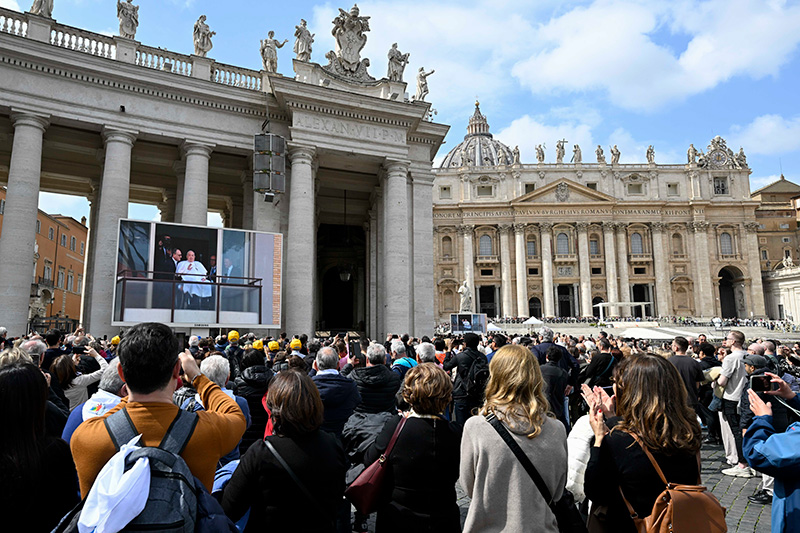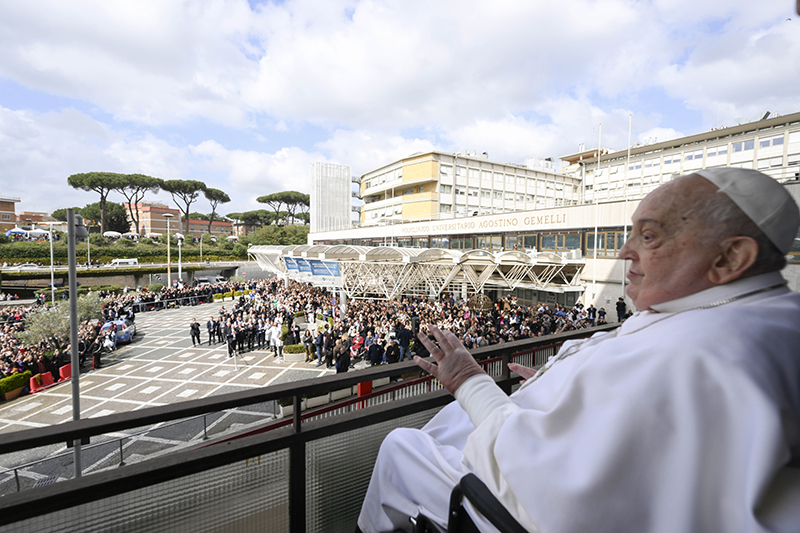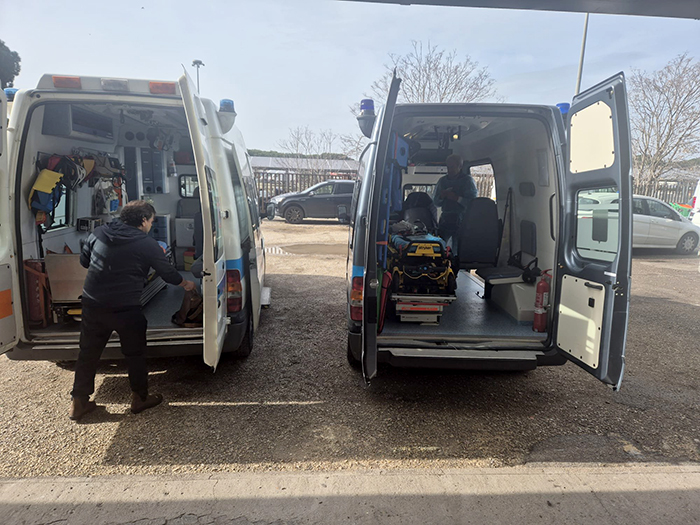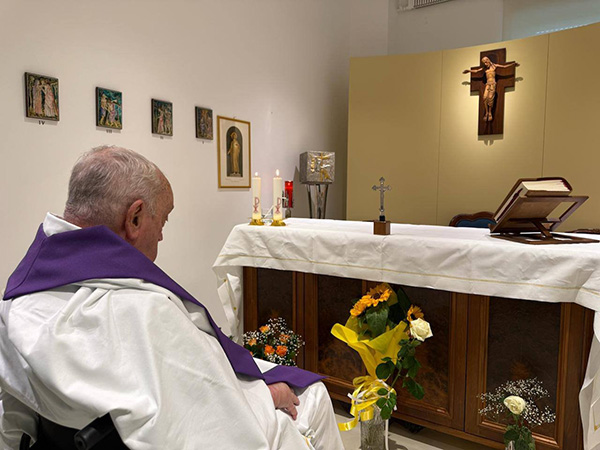 Visitors and pilgrims in St. Peter's Square at the Vatican gather in front of a video screen to see Pope Francis greet well-wishers at Rome's Gemelli hospital before returning to the Vatican March 23, 2025, after 38 days of treatment at the hospital. (CNS/Vatican Media)
Visitors and pilgrims in St. Peter's Square at the Vatican gather in front of a video screen to see Pope Francis greet well-wishers at Rome's Gemelli hospital before returning to the Vatican March 23, 2025, after 38 days of treatment at the hospital. (CNS/Vatican Media)
Pope's condition slowly improving after release from hospital
VATICAN CITY — Home from the hospital after more than five weeks, Pope Francis is showing "slight improvements" in his breathing, ability to speak and mobility, the Vatican press office said.
The 88-year-old pope, released from Rome's Gemelli hospital March 23, is following doctors' orders and is focused on his recovery, the press office told reporters March 28.
His days are devoted to prayer, breathing exercises, physical therapy, rest and handling paperwork sent from Vatican offices to his residence, the Domus Sanctae Marthae.
Each morning, he concelebrates Mass in the small chapel down the hall from his bedroom and private office, the press office said.
Pope Francis has not received any visitors, it said. He spends each day with members of his medical team -- one of whom is on duty 24 hours a day -- and with his private secretaries.
The pope was praying March 28 for victims of a massive earthquake that caused death and destruction in Myanmar and Thailand, the press office said.
In a telegram sent to civil and church authorities in the two countries, Cardinal Pietro Parolin, Vatican secretary of state, said the pope was "deeply saddened by the loss of life and widespread devastation."
"Pope Francis offers heartfelt prayers for the souls of the deceased and the assurance of his spiritual closeness to all affected by this tragedy," the message said. The pope also prayed that emergency workers would be given "the divine gifts of fortitude and perseverance."
The pope was hospitalized Feb. 14-March 23 after a case of bronchitis worsened, making it difficult for him to breathe. He was diagnosed with multiple infections and then with double pneumonia, resulting in several life-threatening breathing crises.
The Vatican press office said that since the pope was released from the hospital, he has had a reduced need for supplemental oxygen and is using high-flow oxygen through a nasal cannula during only part of the night.
The results of blood tests performed March 26 were within the normal range, the press office said. Before they discharged the pope, his doctors said he would continue drug therapy at home to deal with mycosis, a fungal infection, and the press office said he was continuing that medication.
Pope Francis watched the livestream March 28 of the Lenten meditation for cardinals and senior members of the Roman Curia offered by Capuchin Father Roberto Pasolini, preacher of the papal household.
While the Vatican published a schedule of major Holy Week and Easter liturgies March 27, the press office said it was too soon to know if the pope would be in attendance.
Polish President Andrzej Duda visited the Vatican March 28 and met with Cardinal Parolin. Among the gifts the Polish president brought was a rosary for Pope Francis.
Duda and his wife also were at the Vatican March 27, making a pilgrimage to the Holy Door of St. Peter's Basilica for the Jubilee Year and praying at the tomb of St. John Paul II.
The Vatican press office announced March 28 that Cardinal Parolin would preside at a memorial Mass in St. Peter's Basilica April 2, the 20th anniversary of the death of the Polish pope.
— Cindy Wooden, Catholic News Service
Pope returns to Vatican after long hospitalization
ROME — Immediately before leaving Rome's Gemelli hospital after more than five weeks of treatment for breathing difficulties, double pneumonia and infections, Pope Francis greeted hundreds of people who gathered outside the hospital March 23.
With a very weak voice, Pope Francis thanked the crowd, waving his hands and giving a thumbs up.
He also pointed to a woman carrying a yellow-wrapped bouquet of flowers and told the crowd, "She's good."
An aide had pushed Pope Francis in his wheelchair onto the balcony overlooking the square outside the hospital. Some 600 people had gathered at the hospital, including Rome's Mayor Roberto Gualtieri. Hundreds of people also gathered in front of video screens in St. Peter's Square to see the pope for the first time since he was hospitalized Feb. 14.
The pope left the hospital almost immediately after his appearance on the balcony.
The motorcycle police leading the pope's motorcade turned onto the street leading to the Vatican entrance closest to his residence and then turned around. Rather than go directly home, Pope Francis was driven through the center of Rome to the Basilica of St. Mary Major where he has prayed before and after every foreign trip and after his two previous hospitalizations for abdominal surgery.
Pope Francis did not go into the church but left a bouquet of flowers to be placed on the altar under the Marian icon "Salus Populi Romani" or "Health of the Roman People."
Television footage of the pope, seated in the front seat of a white Fiat, showed he was using oxygen through a nasal tube.
Just before the 88-year-old pope had come out on the hospital balcony, the Vatican released a text he had prepared for the midday Angelus prayer.
The pope's message focused on the day's Gospel reading of the parable of the fig tree from Luke 13:1-9, in which a gardener asks a landowner to allow him to spare a fig tree that had not borne fruit for three years; the gardener asks to be given a year to fertilize and care for the tree in the hope that it would bear fruit in the future.
"The patient gardener is the Lord, who thoughtfully works the soil of our lives and waits confidently for our return to him," the pope wrote.
"In this long period of hospitalization, I have experienced the Lord's patience, which I also see reflected in the tireless solicitude of the doctors and health care workers, as well as in the in the attention and hopes of the family members of the sick," who also are in the Gemelli, he wrote.
"This trusting patience, anchored in God's love that does not fail, is indeed necessary in our lives, especially in facing when the most difficult and painful situations," Pope Francis wrote.
But, like the other messages he released from the hospital on Sundays, the pope also urged prayers for peace and commented on current events.
"I was saddened by the resumption of heavy Israeli shelling on the Gaza Strip, with so many dead and wounded," he said. Israel, citing an impasse in negotiations with Hamas militias, began launching aerial attacks on Gaza March 18, ending a ceasefire that had begun in January.
"I call for an immediate silencing of the weapons; and the courage to resume dialogue, for all hostages to be released and for a final ceasefire to be reached," the pope wrote. The humanitarian situation in Gaza "is once again very serious and requires urgent commitment from the conflicting parties and the international community."
Dr. Sergio Alfieri, head of the medical team treating the pope, had told reporters March 22 that in his rooms at the Domus Sanctae Marthae, the pope will continue using oxygen as needed through a nasal tube, will be taking medication to fight a lingering mycosis, a fungal infection, and will be continuing his physical therapy and respiratory therapy.
The doctors have prescribed two months of rest and recuperation and have urged the pope not to meet with large groups during that time. They also said his voice will require time to recover.
Dr. Luigi Carbone, the assistant director of the Vatican health service and a member of the medical team treating the pope at Gemelli hospital, said that other than an oxygen tank, no special equipment would be needed in the pope's room. He added, though, that the Vatican health service has a doctor and other personnel on duty 24 hours a day.
Even after the pope's return to the Vatican was announced, the rosary for him and for all the sick was continuing in St. Peter's Square each evening.
The crowd gathered to pray March 22 loudly applauded when Archbishop Giordano Piccinotti, president of the Administration of the Patrimony of the Holy See, began the recitation telling them, "The Holy Father is returning home. We give thanks to God and to the Virgin Mary for this great news."
The Vatican press office said that March 23 the rosary would continue and would be led by Cardinal Mauro Gambetti, archpriest of St. Peter's Basilica.
— CindyWooden, Catholic News Service
Love unites the faithful, helps them grow together, pope's message says
-
 Pope Francis greets well-wishers at Rome's Gemelli hospital before returning to the Vatican March 23, 2025, after 38 days of treatment at the hospital. (CNS photo/Vatican Media)
Pope Francis greets well-wishers at Rome's Gemelli hospital before returning to the Vatican March 23, 2025, after 38 days of treatment at the hospital. (CNS photo/Vatican Media)Love unites the faithful, helps them grow together, pope's message says
VATICAN CITY — In his last written message from Rome's Gemelli hospital before returning to the Vatican, Pope Francis greeted bishops and the faithful from the Archdiocese of Naples on their Holy Year pilgrimage.
More than 12,000 pilgrims were present in St. Peter's Square March 22 to celebrate Mass with Cardinal Domenico Battaglia of Naples as part of the pilgrimage.
Before the Mass, the cardinal read the pope's written message, greeting all those attending, including pilgrims from several other Italian dioceses. The pilgrimage also marked the 10th anniversary of the pope's first visit to Naples and Pompeii March 21, 2015.
The presence of several dioceses marking the Holy Year with a pilgrimage to Rome expresses "the unity that gathers you as a community around your pastors and the bishop of Rome," said the pope's message, which was released by the Vatican.
Walking through the Holy Door as part of their pilgrimage also shows their "commitment to embrace Jesus' invitation to enter 'through the narrow gate'," the text said.
"Love is like this: it unites and makes us grow together. That is why, even though your paths are different, it has brought you here together at the tomb of Peter, from which you can depart even stronger in faith and more united in charity," the pope wrote.
While the pope was released from the hospital the next day, March 23, after 38 days recovering from double pneumonia, the pope wrote that he had "strongly felt the support of your closeness, especially through the prayers with which you have accompanied me."
"Although I cannot be physically present among you, I express to you my great joy in knowing you are united with me and among yourselves in the Lord Jesus, as church," the message said.
— Carol Glatz, Catholic News Service As Pope Francis leaves hospital, his almoner and doctors bring medical care to migrants
-
As Pope Francis leaves hospital, his almoner and doctors bring medical care to migrants
 Two ambulances are seen March 23, 2025, in Romanina, a suburb of Rome. On the same day Pope Francis was discharged from Rome's Gemelli hospital after a five-week stay for treatment, a group of Vatican doctors took their Lenten alms initiative a step further, drove two ambulances from the Vatican to Romanina and helped provide medical care to a group of migrants. (OSV News/courtesy Dicastery for the Service of Charity)ROME — The same day Pope Francis was discharged from Rome's Gemelli hospital after a five-week stay for treatment for double pneumonia, a group of Vatican doctors took their Lenten alms initiative a step further and helped provide medical care to a group of migrants.
Two ambulances are seen March 23, 2025, in Romanina, a suburb of Rome. On the same day Pope Francis was discharged from Rome's Gemelli hospital after a five-week stay for treatment, a group of Vatican doctors took their Lenten alms initiative a step further, drove two ambulances from the Vatican to Romanina and helped provide medical care to a group of migrants. (OSV News/courtesy Dicastery for the Service of Charity)ROME — The same day Pope Francis was discharged from Rome's Gemelli hospital after a five-week stay for treatment for double pneumonia, a group of Vatican doctors took their Lenten alms initiative a step further and helped provide medical care to a group of migrants."The time of Lent is a special time of almsgiving, when we share ourselves with others. This almsgiving must cost us, must hurt us," Cardinal Konrad Krajewski, prefect of the Vatican's Dicastery for the Service of Charity, told OSV News .
For the whole day March 23, 12 doctors served migrants on the outskirts of Rome.
"There is a huge skyscraper inhabited by about 500 migrants who have no access to medical care, often have no documents, often run away and do not want to be seen, recognized," Cardinal Krajewski said.
"That's why we arrived in two ambulances from the Vatican, and throughout the day we were trying to put alms into action," the pope's charity point man told OSV News.
Giving alms is "not to think about ourselves, but to help others," Cardinal Krajewski said as he returned from Italy's capital Romanina suburb, where he coordinated a group of medics.
The Vatican health clinic for the needy was opened in St. Peter's Square next to St. Peter's Basilica right before Christmas in 2018 to assist the homeless and those impoverished, furthering Pope Francis' commitment to supporting those in need at the very heart of the Catholic Church.
The Mother of Mercy clinic followed previous efforts by Cardinal Krajewski -- the installation of showers and a barbershop.
All doctors volunteering in the clinic are working in Roman hospitals on a daily basis. In February alone, they treated 1,300 people in need of medical care.
"We have 82 volunteers and we are open all week long," Cardinal Krajewski said, adding that each doctor has one or two on-calls in the clinic, and that the Lenten initiative was an extra activity for them.
"It is a beautiful time, especially for those people who can be examined and receive the most important first aid," Cardinal Krajewski said.
He added: "But it is also a time when we become more beautiful by sharing what we have received from God and his gifts with others."
— Paulina Guzik, OSV News
Vatican releases first photo of Pope Francis since his hospitalization
-
Vatican releases first photo of Pope Francis since his hospitalization
 Pope Francis is seen in the chapel of his suite of rooms at Rome's Gemelli hospital March 16, 2025. The Vatican press office said the 88-year-old pope concelebrated Mass that morning. (CNS photo/Vatican Press Office)ROME — For the first time since Pope Francis was hospitalized in mid-February, the Vatican press office released a photograph of him March 16; the image shows him concelebrating Mass that morning in the chapel of his suite of rooms at Rome's Gemelli hospital.
Pope Francis is seen in the chapel of his suite of rooms at Rome's Gemelli hospital March 16, 2025. The Vatican press office said the 88-year-old pope concelebrated Mass that morning. (CNS photo/Vatican Press Office)ROME — For the first time since Pope Francis was hospitalized in mid-February, the Vatican press office released a photograph of him March 16; the image shows him concelebrating Mass that morning in the chapel of his suite of rooms at Rome's Gemelli hospital.The Mass also was the first the Vatican described as concelebrated by the 88-year-old Pope Francis in the hospital. He has been receiving the Eucharist daily and on the previous Sundays was described as having "participated" in the liturgy.
The Vatican press office did release a 27-second audio message from Pope Francis March 6 thanking people for their prayers. The pope had obvious difficulty breathing and speaking.
But for the fifth Sunday in a row, Pope Francis did not come to his window for the recitation of the Angelus prayer, but he may have seen some yellow or white balloons fly past his hospital room.
More than a hundred children gathered March 16 in the square in front of Rome's Gemelli hospital to pray the Angelus; many were hoping the pope would come to his window to wave while a few of the little ones were more concerned about keeping ahold of their balloons.
Although the pope did not come to the window, he thanked the children in the message the Vatican press office published at noon.
"I know that many children are praying for me; some of them came here today to Gemelli as a sign of closeness," he wrote. "Thank you, dearest children! The pope loves you and is always waiting to meet you."
Pope Francis has been hospitalized since Feb. 14 and continues to be treated for double pneumonia and multiple infections. His doctors have said his condition continues to improve gradually, so they do not expect to publish another medical bulletin until March 18 or 19.
In the square under the pope's window, Elena, 8, came with a group from Sacred Heart School in Rome's Monte Mario neighborhood "because the pope is in the hospital. We wanted to show our affection to make him feel better."
Giulio, 10, knows Pope Francis personally. "I met him when I was little and again when he baptized my little sister" three years ago. Giulio's dad works at the Vatican, and was one of the employees whose newborns were baptized by the pope in the Sistine Chapel in 2022.
Leonardo was part of a group of 22 Beaver Scouts, ages 5-7, who "came to see the pope" from Jesus the Divine Teacher Parish not far from the hospital. He wanted people to know, though, that he is 7 and a half.
The children's trek was coordinated by the Pontifical Committee for the World Day of Children and the Sant'Egidio Community's School of Peace program.
Marco Impagliazzo, president of Sant'Egidio, told reporters the children wanted to wish the pope a speedy recovery and "thank him for his words of peace, which he gives every day."
In fact, the pope's Angelus message included a request that people "continue to pray for peace, especially in the countries wounded by war: tormented Ukraine, Palestine, Israel, Lebanon, Myanmar, Sudan and the Democratic Republic of the Congo."
Pope Francis also used the message to affirm his decision, announced the previous day, to launch a three-year program to ensure implementation of the recommendations of the Synod of Bishops on synodality to promote a culture of listening to one another, valuing the gifts of each member of the church and encouraging all Catholics to take responsibility for the church's mission.
Commenting on the day's Gospel reading, which recounted the Transfiguration, Pope Francis said that when Jesus took his disciples up the mountain and was transfigured, he showed them "what is hidden behind the gestures he performs in their midst: the light of his infinite love."
Saying that he was writing while "facing a period of trial," the pope said that he joins "with so many brothers and sisters who are sick: fragile, at this time, like me."
"Our bodies are weak," he wrote, "but even like this, nothing can prevent us from loving, praying, giving ourselves, being for each other, in faith, shining signs of hope."
And, the pope said, the light of God's love shines in the hospital through the care of doctors, nurses, orderlies and the entire staff. "That is why I would like to invite you, today, to join me in praising the Lord, who never abandons us and who, in times of sorrow, places people beside us who reflect a ray of his love."
In the afternoon, Argentine dancer Daiana Guspero brought a dozen couples to square under the pope's window to dance the tango, his favorite dance, as a form of prayer for him.
— Cindy Wooden, Catholic News Service





